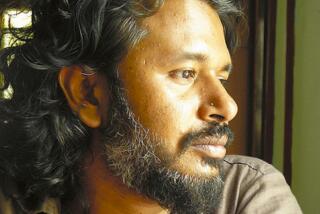Sri Lanka ETHNIC FRATRICIDE AND THE DISMANTLING OF DEMOCRACY by S. J. Tambiah (The University of Chicago: $17.95; 184 pp.)
- Share via
Most people who go to Sri Lanka never see its dark side; most people who don’t, and only read about it in their newspapers, see little else.
One of its faces is that of an island paradise: palm-fringed tropical beaches surrounding spectacular highland landscapes; magnificent archeological monuments; happy, well-fed, smiling children; generous hospitality; hardly any beggars.
Yet, it is also a country where the majority still believes that there really is such a thing as the “Aryan race” and that belonging to it is something to be proud of--to the point that Sri Lankan Tamils, who have been there at least as long as everybody else and cannot be distinguished by any physical characteristics, are treated as hostile interlopers and sporadically massacred in outbursts of ethnic rioting. All this, moreover, in one of the few ex-colonies where the Anglo-Saxon traditions of democracy, the rule of law, and the impartial administration of justice really seemed to have taken root and to have survived for decades after independence.
No wonder, then, that the bibliography on Sri Lanka’s current troubles grows apace. The present contribution comes from the pen of a distinguished expatriate Sri Lankan anthropologist. Like everyone else’s, S. J. Tambiah’s view is personal. As it happens, he is a Tamil, but much of what he says could have been said with equal credibility by an enlightened Sinhalese. Nonetheless, it is a curiously uneven work. The author calls it an “engaged political tract,” yet most of it is laudably scholarly, blemished only by the occasional use of words like “diabolical” to qualify something that has more to do with short-sightedness or stupidity than with the malevolent works of Satan.
Like everyone who writes about modern Sri Lanka, Tambiah’s problem is to explain the sporadic--and ominously increasing--outbursts of racist pogroms. He tries economics: It helps, but it doesn’t really account for the phenomenon--other societies have similar economic problems, yet most of them don’t start burning down people’s houses and shops. In a brilliant essay in Chapter 6, which could stand on its own, he tries his own discipline of anthropology--only to fall into the classical trap of debating who got to the island first: As Americans know better than anyone, where your ancestors came from, and how long ago, is about the least important thing that ought to determine your relations with your neighbors.
So, in his penultimate chapter--before an epilogue in which he modestly, but candidly, describes his personal formation on these issues--he puts forward his own prescription for the resolution of Sri Lanka’s problems. Coming from a thoughtful, kind and civilized man, one is not surprised that they center on sanity, restraint, empathy, generosity, the rule of law, non-discrimination, pluralism and all the other obvious political virtues. Others have said much the same: The trouble is that the bigots, the fanatics, the arrogant, the intolerant, the oppressive and the violent just don’t listen to the sweet voice of reason--instead, they reach for their guns and shoot a few more of their neighbors, whom one can then hardly blame for shooting back.
Which makes this an excellent and thought-provoking book, for anyone who cares about Sri Lanka. But whether it will have the slightest effect on the sad state of that troubled island is quite another question.
More to Read
Sign up for Essential California
The most important California stories and recommendations in your inbox every morning.
You may occasionally receive promotional content from the Los Angeles Times.













